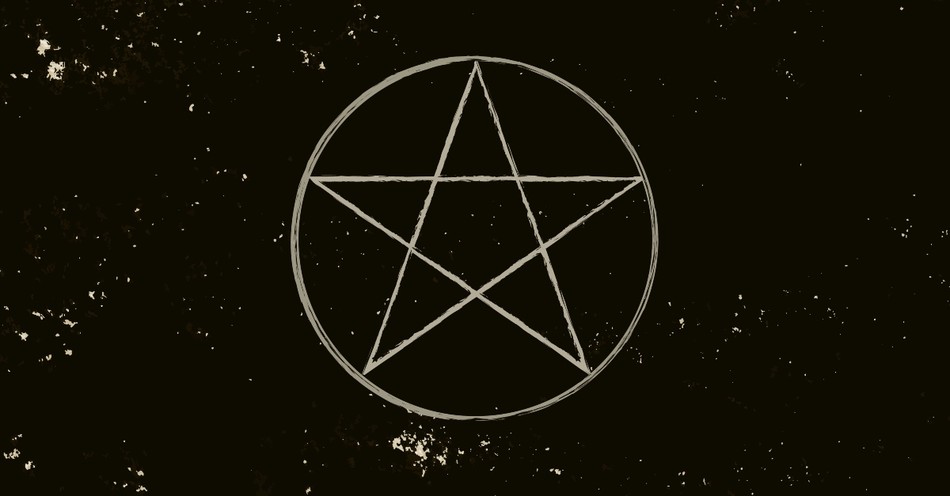What is a pentagram, and should Christians wear them or use them as decor in their homes? Here are some facts about pentagrams, including their ancient meaning, usage, and modern association with this symbol.
Five-Pointed Star Vs. Pentagram
A pentagram and a five-pointed star are different symbols: Matt Slick explains that the pentagram is “a five-pointed star, enclosed in a circle, with one point in the downward position [although] some pentagrams don’t have the circle.”
These are some general guidelines. Pentagrams are associated with the occult, especially Satanic groups.
Numerous organizations have claimed the five-pointed star (point upright, as distinct from the occult pentagram) as one of their symbols in both ancient and relatively modern times.
Alison Eldridge explained that “among Christians, it has symbolized the five wounds of Christ — his hands and feet punctured by the Crucifixion and his side pierced by a soldier’s spear — as well as the Star of Bethlehem and Christ himself.”
However, this symbol is also used by Muslims, the Bahai Faith, and Wicca.
Perceived Meaning of the Pentagram
A comparison between the point-up star and the point-down star (both generically referred to as pentagrams) is similar to that between people who wear a cross and those who wear an upside-down cross.
The traditional cross signifies Christ’s crucifixion, while the latter mocks it. One is considered “positive” and the other “negative” wherever one intends to convey a message of any kind. So, too, with the pentagram.
As with the cross, five-pointed stars and pentagrams are worn as pendants, earrings, and tattoos by people who simply like the design. There is sometimes no meaning behind its use, or an article has been passed down by a family member and is now an heirloom.
Many people wear a cross but do not truly worship Christ; the same can be said for individuals who wear the five-pointed star or pentagram. They might boast one on an article of clothing, jewelry, or as part of a tattoo, yet have no idea what people think when they see it.
The significance of many symbols changes depending on cultural associations. How are pentagrams regarded today?
Whereas members of certain societies have used the pentagram as a way of recognizing one another and also as a ceremonial device, is the pentagram currently indicative of devil worship?
The Pentagram According to Non-Christian Society
As far as the wearers are concerned, the answer could be yes or no. The five-pointed star is currently used by modern pagan groups, says Alison Eldridge.
For Wiccans, “five points often represent the five elements of air, fire, water, earth, and spirit. [The] pentagram may also symbolize masculine and feminine, or the Triple Goddess (three points) and the Horned God (two points).”
It is often regarded as a protective talisman used to “invoke or banish spirits.” An inverted pentagram, the point facing downward, is significant to those who worship the devil or in groups that reference Satan without actively worshiping him in the form of occult rituals.
But worship is not merely an activity involving certain signs and rituals. Worship means “to regard with great or extravagant respect, honor, or devotion” and can be non-religious.
Worshipers invest a person, or a principal, with power.
They host events in which participants share a common goal, which is to promote and discuss their shared belief. The Church of Satan was not created to “promote evil” but to promote “humanistic values.”
God’s Perspective on Pentagrams
That the group once employed magic, “colorful rituals,” makes no difference to God’s view of this church: any object of worship other than himself is unacceptable.
“You shall not make for yourself a carved image, or any likeness of anything that is in heaven above, or that is in the earth beneath, or that is in the water under the earth. You shall not bow down to them or serve them, for I the LORD your God am a jealous God” (Exodus 20:4-5).
Since the church claims they do not worship Satan or stand for evil, employing his image — to them — is more about what they stand against (the Christian faith) than what they stand for (empiricism, self).
Choosing to name themselves Christ’s chief enemy is like giving God the finger — it is an act of clear rejection, not a side effect of ignorance or confusion.
There is no missing the point that members of the Church of Satan deliberately view Christ and his followers with contempt.
The Power of Association
Symbols come with baggage. Christians must understand that what they wear, just like what they say, communicates information. Jesus told his listeners, “I tell you, on the day of judgment, people will give account for every careless word they speak” (Matthew 12:36).
James wrote, “Whoever knows the right thing to do and fails to do it, for him it is sin.” Once you understand the perceived interpretations of symbols such as pentagrams and other images, you cannot behave as though you are ignorant.
You are saying something, and once you know what that is, it is a rejection of God’s Lordship to wear such an image. Even if a person does not align himself or herself with a particular set of beliefs, there is a problem here.
For example, Slick says, “A lot of Mormons put their five-pointed stars on their homes. I do not want to appear to support Mormonism inadvertently.”
Mormonism is not a sect of Christianity but a different religion altogether. “I do not want to confuse [people] and misrepresent myself and my Lord accidentally,” Slick explained.
The five-pointed star is not always a symbol of religious belief, but does your neighbor know that? And what does it say to one’s neighbor that a follower of Jesus chooses to do whatever he likes, even if he is acting in contradiction of God’s instruction?
Tainting Christian Symbols
Christians are associated with symbols too. As long as so-called disciples of Jesus Christ behave hatefully towards any group (indigenous people, refugees, LGBTQ, African American, Latin American), they also tarnish the reputation of Jesus and give new, ugly meaning to symbols such as the fish, the cross, and even the Bible itself.
Pentagrams remind us that there are religions out there whose followers are devotees of other gods or the god of “self,” but who might behave with kindness and reason.
They offer what appears to be a more appealing leader than the local pastor if one’s church snubs outsiders and promotes superficially good behavior instead of being a genuine beacon of light and love in the community.
“Christians are to use wisdom in their freedom so as not to stumble others.” Any powerful symbol we display has the potential to send a message and even to lead people astray.
If a new Christian sees a mature Christian wearing a pentagram, he might form some false and dangerous impressions about God, such as an idea that we can get to him through means other than his Son; that hell is not real; or that we can do what we want as long as we believe in Christ; that Christianity is just one more behavior-based system, not a transformative relationship.
But when we know the gospel message well, it becomes clear that God gave us only one route home. No matter how many good deeds members of an occult or atheistic church are responsible for, if they reject Jesus, then their message will lead followers to eternal misery.
Many people do not want to choose a single path, but the truth is “there is salvation in no one else, for there is no other name under heaven given among men by which we must be saved” (Acts 4:12).
All Idols Are Sinful
Pentagrams are not a poor choice of decor or adornment because there is something inherently evil about them. Idols in themselves are lifeless and useless (Psalm 135:15-18).
Yet they implicitly distract glory away from God, at least in North American culture, because of cultural associations.
Why draw attention to a treasonous symbol when Jesus taught, “What I tell you in the dark, say in the light, and what you hear whispered, proclaim on the housetops” (Matthew 10:27).
We have a responsibility to those around us who are weaker than we are to select our adornments wisely.
For further reading:
Who Are of the Synagogue of Satan?
What Should Christians Know about the Religion of Wicca?
Photo Credit: ©iStock/Getty Images Plus/WhataWin




